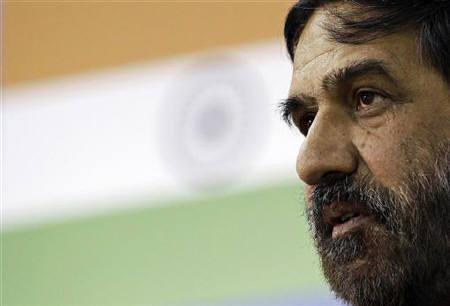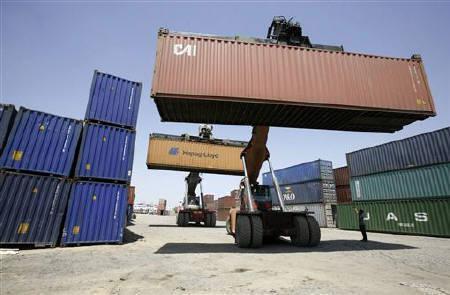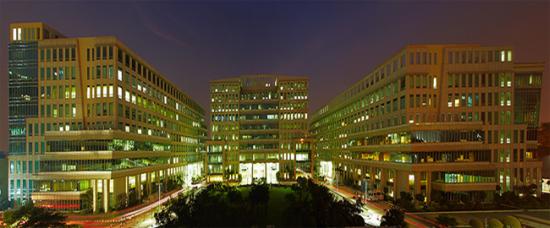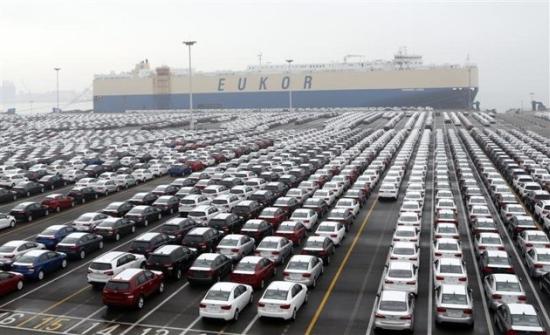Photographs: Francois Lenoir/Reuters Business Standard in New Delhi
India's exports need free trade and reform. The government, however, is extending failed schemes.
The Annual Supplement to the Foreign Trade Policy, released on Thursday by Commerce Minister Anand Sharma, shows exactly how few new ideas the United Progressive Alliance (UPA) has in its ninth year of operation, and how ineffective are those few ideas that it does have.
Remember, India's external payments are close to a crisis. Exports in March continued to grow, though marginally, but for the full year of 2012-13 they fell 1.7 per cent compared to 2011-12 - which itself was no great year for Indian exporters.
Meanwhile, imports rose to $490 billion, leaving India with a trade deficit of $190 billion - in other words, the trade deficit is close to two-thirds of the total export receipts.
This is more than just a problem of temporary external vulnerability that will go away when crude or gold prices fall further - this is a structural inability to pay for imports with exports.
...
Why govt export schemes are ineffective
Image: Mobile cranes prepare to stack containers at Thar Dry Port in Sanand in Gujarat.Photographs: Amit Dave/Reuters
That's why it was important to see this year's supplement to the foreign trade policy make a genuine effort at laying out how merchandise exports could begin to capture some of the markets that are now opening up, thanks to China's inevitable transition to being a high-cost economy.
What the supplement eventually revealed was a complete lack of new thinking, as if more of the same is capable of improving matters - though it noticeably failed to do so last year.
With an air of great achievement, Mr Sharma told reporters that "a major decision" had been taken to extend the scheme that provides zero per cent import duty on capital goods meant for production, as long as they are matched by a manifold increase in exports.
A similarly "major" decision to extend the scheme had been taken last year. The ministry has now decided to extend it further, and broaden its scope to those industries that previously were eligible only for 3 per cent duty on such imports.
...
Why govt export schemes are ineffective
Image: DLF IT SEZ, Chennai. Govt continues to believe that SEZs will lead to export boom.Photographs: Courtesy, DLF
The interest subvention scheme, by which interest on loans to exporters is reduced by two percentage points, had already been extended till March 2014 ; so, in order to be apparently doing something, the scope of the scheme has been extended to various sub-sectors related to textiles - as it was in last year's supplement, too.
Meanwhile, a series of additional exemptions offered to Special Economic Zones reveals that hopes that SEZs would lead an export boom continue to be unfounded.
But, again, who needs to change old ideas when they can be extended for another limping, lame-duck year?
What could have helped exports was if the policy had made an attempt to clean up the business environment in such a way that there were fewer hurdles to exporters.
That could have been achieved if the government had recognised that the trade policy could no longer remain the exclusive domain of the commerce and industry ministry.
...
Why govt export schemes are ineffective
Image: Cars made by Hyundai Motor are seen at a ship yard.Photographs: Lee Jae-Won/Reuters
It was necessary for the policy to highlight the actions required to be taken by other ministries and departments of the government to deal with the larger issues of promoting exports.
In the absence of such an approach, the policy has continued with complicated incentive schemes leading to rent-seeking.
If they nudge exporters into buying capital equipment, for example, that means export sectors are being encouraged to be capital-intensive.
So, how does that help employment, as is claimed? Instead of extending failed schemes for another year, the UPA must realise that it needs to shut them down - and instead focus on freer trade and quicker domestic reform.
Only then will the structural inability of India to export enough be corrected.






article